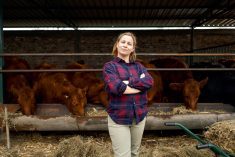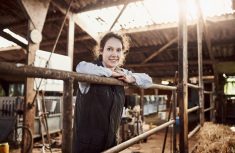Continuing with the succession planning or transitioning theme, along with a major milestone birthday, I can’t help but reflect from my senior generation position — even though I can hardly believe that is now my vantage point.
In his book The Legacy Spectrum, Mark A. Weber stresses, as I have also done, that the process is a journey and not a one-off event. His book may be more on estate planning and is not solely focused on ranchers and farmers, but the same principles apply.
He suggests five questions to reflect on:
Read Also

Research shows rest stops of no benefit to feeder calves during long hauls
Three Canadian transport trials showed that providing a rest stop during long-distance transport provided no clear or consistent benefits for the health or welfare of feeder calves.
1. How do you know how much is enough for your financial security?
2. How much money should you leave your children?
3. How do you use your money to help your children and/or grandchildren become responsible adults and good community citizens?
4. How do you give back to the community that has given you so much?
5. How can you be confident that your plan will achieve your goals should you lose your physical and mental capacity?
From Arthur C. Brooks’s book, Strength to Strength, are exercises developed by a former Harvard Business School professor, the late Clayton Christensen.
Allocate time well ahead of time. In holistic management, it’s comparing options or marginal reactions. It used to be referred to as the biggest bang for the buck when considering two different strategies. The emphasis (or my focus) was on the financial side of the equation. But Christensen and an expanded view make me realize that often it is as important to consider the return on time and personal energy. A recurring theme from many I work with is the shortage of time. This certainly comes into play for us older folks. When I first heard a podcast by Arthur Brooks, one thing that truly struck me is his saying “We reach a point when realizing that it is no longer money that we may be short of, but time.”
Do your core job. The reference in Brook’s book here is the importance of strengthening relationships, but not only from your vantage point. Also consider the needs of the other person.
Invest intelligently. Again, Brooks is not referring solely to finances but our significant relationships. He suggests this all goes hand in hand with a shift from extrinsic goals to intrinsic ones.
The next chapter or stage in life is an exercise through the Modern Elder Academy, developed by Chip Conlon. At a later stage in life, after a successful career in the hospitality industry, he found himself dispensing wisdom, not knowledge. He wanted to expand the idea and ended up developing the Modern Elder Academy.
Questions asked of those transitioning to the next stage are:
1. What activities will you keep?
2. What activities will you evolve and do differently?
3. What activities will you let go of?
4. What new activities will you learn?
5. What will you commit to doing in the next week to evolve into the new you?
6. What will you commit to doing in the next month?
7. What will you commit to doing in the next six months?
8. In a year, what will be the first fruits to appear due to your commitment?
Brooks goes on to share some lessons for the reset — find something you truly enjoy, do the most interesting thing you can, and the change does not have to be a straight line.
Certainly, an overarching theme in Brooks’s work is the importance of human relationships. He uses the analogy of the roots of an aspen tree. Above ground, we may see a group of lone, stoic trees, but below, the roots of all these trees extend and are intertwined. This is ultimately what supports, nourishes and strengthens the tree. Of course, the sun’s energy and precipitation are also factors.
Two things come to mind about wisdom and relationships.
One is the mentor-mentee relationship. I am pleased to see so many excellent programs such as the Cattlemen’s Young Leaders (CYL) and the Canadian Western Agribition Next Gen program. I am fortunate to be a part of the CYL. But these relationships do not always need to be part of a formal program. When my dad passed away a few years ago, many came forward and shared with us that he had been a great mentor to them,albeit informally. Much value and gratitude had been placed on those relationships.
Another suggestion circulating in business management circles is to create an advisory board, a helpful tool in the transition process. I recently heard of an interesting twist on that from a respected farmer in our area. He holds a “Professional Fencing Day.” It is intentionally on Farmer’s Day in June. He invites all the professionals he works with — lawyers, accountants, doctors, dentists, bankers, ag advisors, etc., to join him and his family on the farm to spend the afternoon building fence. The day wraps with a celebration supper, many of the ingredients grown on that farm. The day goes beyond his expectations for learning, sharing, gratitude and, most importantly, relationship building. It allows the professionals to see the actual workings of life on the farm and work alongside the farming family to accomplish a big project. I think it is a wonderful idea and something that most of us could easily do.
I would love to hear more stories of strengthening the roots. Please feel free to share some. You can email me at [email protected].
















